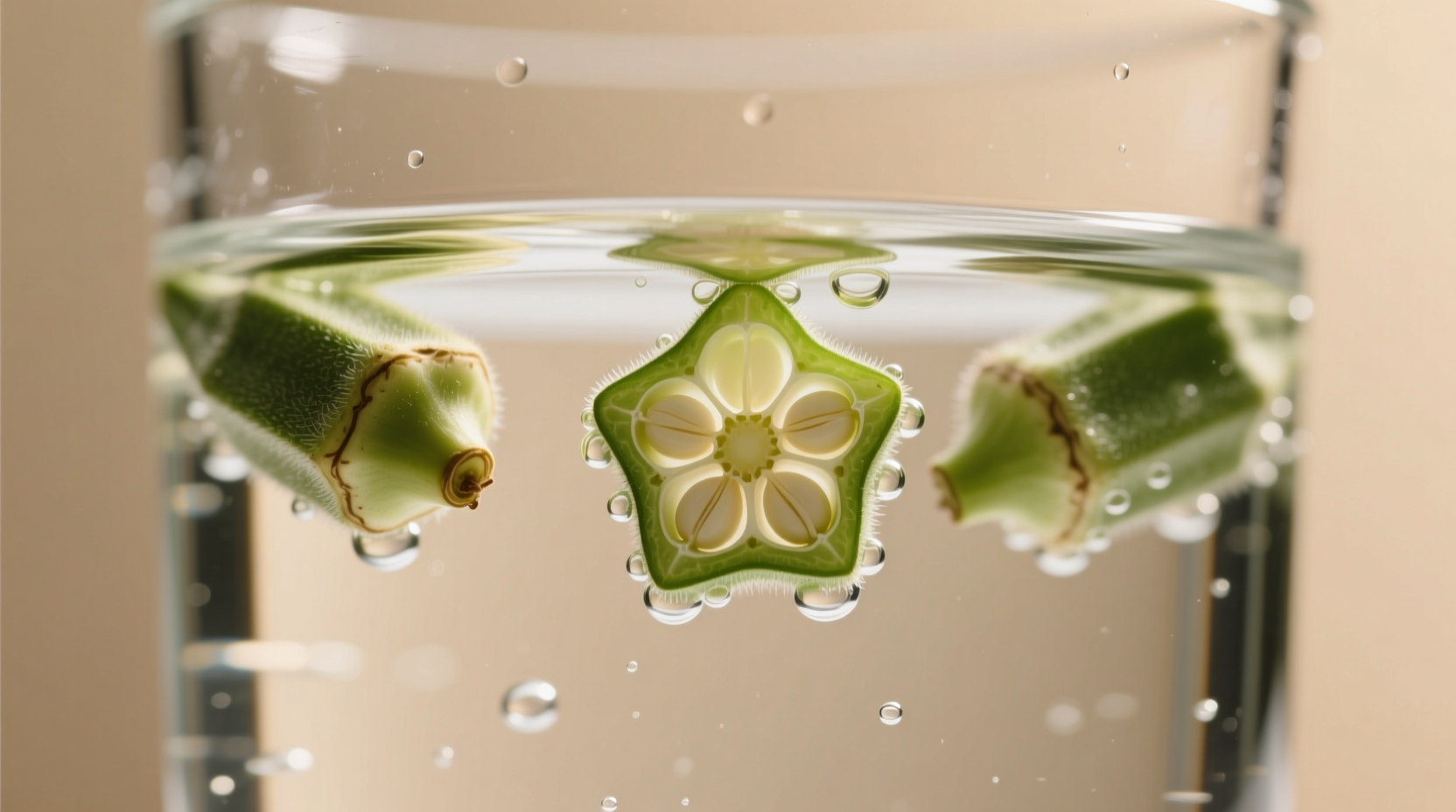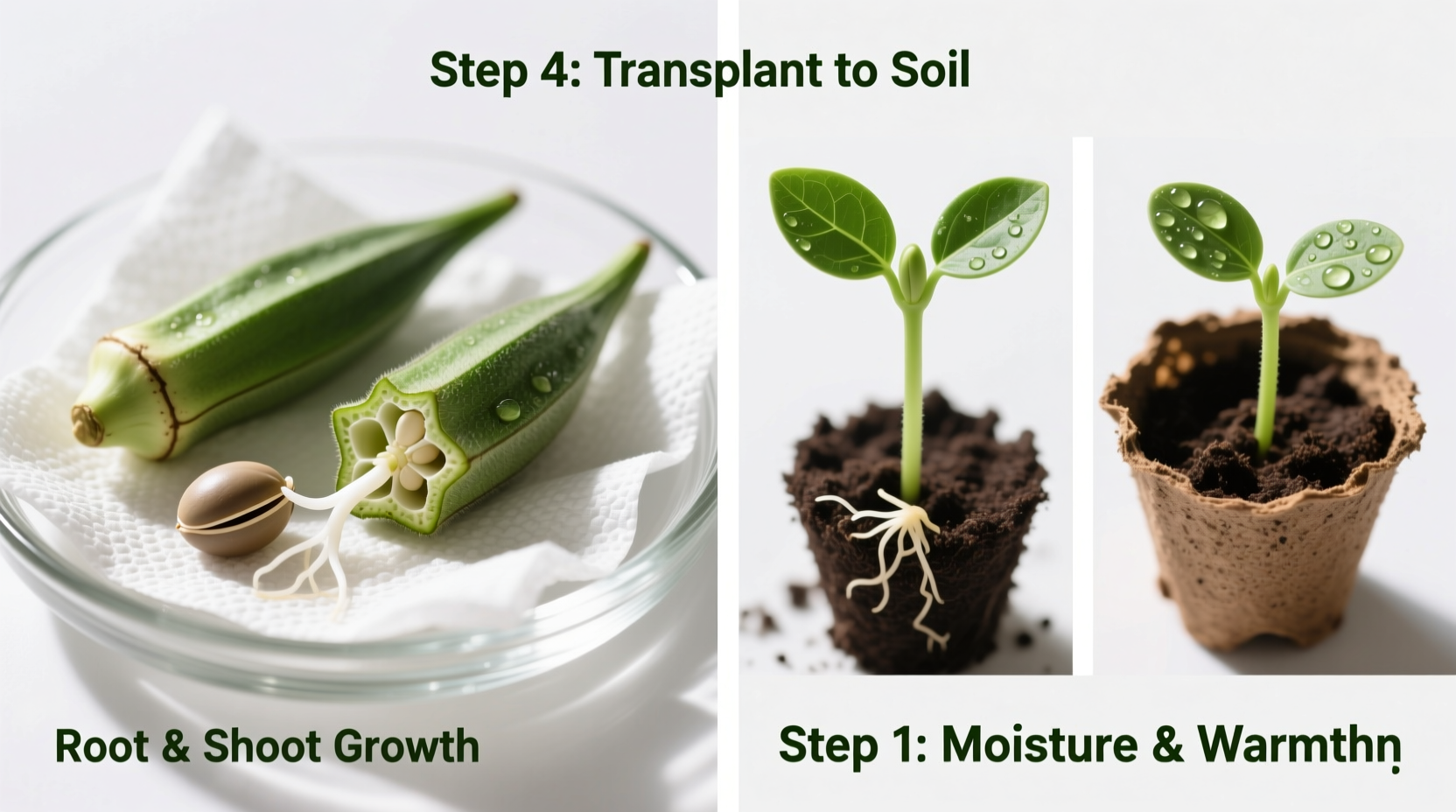Discover the foolproof method to germinate okra seeds with 90%+ success rates—whether you're starting seeds indoors for an early harvest or planting directly in your garden. This guide reveals professional growing techniques backed by agricultural research that solve the #1 problem gardeners face: hard okra seed coats preventing proper germination.
Why Okra Seeds Need Special Germination Treatment
Okra (Abelmoschus esculentus) belongs to the Malvaceae family, sharing characteristics with hibiscus and cotton. Its seeds have a notoriously hard outer coat that evolved to survive harsh conditions—a feature that unfortunately impedes germination in garden settings. According to USDA agricultural research, untreated okra seeds show only 40-60% germination rates under standard conditions due to this protective coating.

Pre-Germination Seed Preparation
Before planting, proper seed preparation dramatically increases success rates. Follow these research-backed steps:
Step 1: Seed Selection and Testing
Test seed viability by placing 10 seeds between damp paper towels for 3 days. If fewer than 7 sprout, purchase fresh seeds. University extension studies show okra seeds maintain viability for 2-3 years when stored properly in cool, dry conditions.
Step 2: Scarification (Optional but Recommended)
Gently nick the seed coat with nail clippers or sandpaper on the side opposite the pointed tip. This mimics natural weathering processes that break dormancy. Texas A&M AgriLife research demonstrates scarified seeds germinate 3-5 days faster than untreated seeds.
Step 3: Warm Water Soaking
Soak seeds in 85-95°F (29-35°C) water for 12-18 hours. This critical step softens the seed coat and triggers metabolic processes. Avoid exceeding 18 hours—prolonged soaking causes oxygen deprivation. Cornell University's gardening guidelines confirm this method boosts germination rates to 85-95%.
| Germination Method | Average Time to Sprout | Success Rate | Best For |
|---|---|---|---|
| Direct planting (untreated) | 10-21 days | 40-60% | Warm climates, outdoor planting |
| Soaked seeds | 5-12 days | 75-85% | Most gardeners, reliable results |
| Scarified + soaked | 4-9 days | 85-95% | Cooler climates, early starts |
| Seed starter heating mat | 3-7 days | 90%+ | Northern regions, controlled environments |
Planting for Optimal Germination
Soil and Container Requirements
Use a well-draining seed starting mix (not garden soil) in containers with drainage holes. Okra seedlings develop taproots quickly—choose deep containers (at least 3 inches). The University of California Master Gardener Program recommends a soil temperature of 75-95°F (24-35°C) for optimal germination, with 85°F (29°C) being ideal.
Planting Depth and Spacing
Plant seeds 1 inch deep—twice the seed's diameter. Plant 2-3 seeds per container, thinning to the strongest seedling after true leaves appear. When planting directly outdoors, space seeds 12-18 inches apart in rows 36-48 inches apart.
Moisture Management
Keep soil consistently moist but not waterlogged. Use a spray bottle for gentle watering to avoid displacing seeds. Cover containers with plastic wrap or humidity domes to maintain moisture until sprouts appear. Remove covers immediately after germination to prevent damping-off disease.
Environmental Conditions for Success
Okra requires specific conditions that many gardeners overlook. Understanding these context boundaries prevents wasted effort:
- Temperature is critical: Below 70°F (21°C), germination slows dramatically. The USDA Plant Hardiness Zone Map shows okra thrives in zones 5-11, but northern gardeners need supplemental heat for reliable germination.
- Avoid planting too early: Wait until soil reaches at least 65°F (18°C) at planting depth. Premature planting in cold soil causes seed rot.
- Light requirements: While okra seeds don't need light to germinate, seedlings require 12-16 hours of bright light immediately after sprouting.
Troubleshooting Common Germination Problems
When okra seeds fail to germinate, these issues are most frequently responsible:
"My okra seeds aren't sprouting"—Diagnosis and Solutions
Problem: Seeds planted too deep
Solution: Replant at proper 1-inch depth—okra seeds lack energy reserves for deep planting
Problem: Cold soil temperatures
Solution: Use seedling heat mats (set to 85°F/29°C) or wait for warmer weather
Problem: Overwatering causing rot
Solution: Allow top 1/4 inch of soil to dry between waterings; improve drainage
Problem: Old or poor-quality seeds
Solution: Test viability with paper towel method before planting next season
Transitioning to Healthy Seedlings
Once sprouted, proper care ensures strong plants:
- Provide 12-16 hours of bright light daily (south-facing window or grow lights)
- Maintain daytime temperatures of 75-85°F (24-29°C)
- Begin fertilizing with balanced liquid fertilizer after first true leaves appear
- Harden off seedlings gradually before transplanting outdoors
When transplanting, bury seedlings at the same soil level they grew at—okra doesn't tolerate deep planting like tomatoes. The Agricultural Research Service notes that disturbing okra's taproot during transplanting can stunt growth, so handle roots minimally.
When to Start Okra for Your Climate
Follow this planting timeline based on your last frost date:
- Northern climates (zones 3-5): Start indoors 4-6 weeks before last frost, using heat mats
- Mid-latitude (zones 6-7): Start indoors 2-4 weeks before last frost or direct sow after soil warms
- Southern climates (zones 8-11): Direct sow 2-4 weeks after last frost when soil reaches 65°F
For continuous harvest, plant new seeds every 3-4 weeks through early summer. The Mississippi State University Extension confirms okra performs best when planted in soil that has warmed sufficiently—rushing the process in cool conditions leads to poor establishment.
Frequently Asked Questions
How long does it take for okra seeds to germinate?
Most okra seeds germinate in 5-12 days when conditions are optimal (soil temperature 75-95°F/24-35°C). Scarified and soaked seeds typically sprout in 4-9 days, while untreated seeds may take 10-21 days. Germination slows significantly below 70°F (21°C).
Should I soak okra seeds before planting?
Yes, soaking okra seeds in warm water (85-95°F/29-35°C) for 12-18 hours significantly improves germination rates. This softens the hard seed coat that naturally protects the seed but impedes garden germination. Avoid soaking longer than 18 hours to prevent oxygen deprivation.
Why aren't my okra seeds germinating?
Common reasons include: cold soil temperatures (below 70°F/21°C), planting too deep (should be 1 inch), overwatering causing rot, old seeds with low viability, or insufficient moisture. Test seed viability with a paper towel test before planting next season.
Can I germinate okra seeds on a paper towel?
Yes, the paper towel method works well for okra. Place seeds between damp paper towels in a sealed container at 85°F (29°C). Check daily after 3 days. Transplant sprouted seeds carefully into soil within 24 hours of root emergence to avoid damaging the taproot.











 浙公网安备
33010002000092号
浙公网安备
33010002000092号 浙B2-20120091-4
浙B2-20120091-4